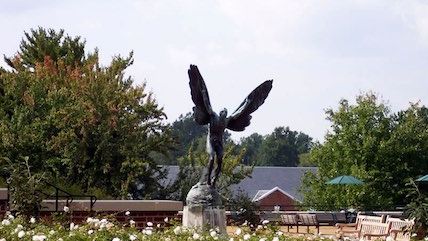The Campus Rape Lawsuit That Could Destroy Title IX Has Finally Arrived
Former UVA law student was punished for sexual misconduct under an improperly low evidence standard.


A University of Virginia law student who was accused of sexual misconduct and banned from campus—years after the alleged incident—is suing the U.S. Education Department for giving UVA no choice but to rule against him.
His lawsuit is a direct challenge to the legality of the campus kangaroo courts the federal government claims are required under Title IX. Lawyers representing the student, John Doe, argue persuasively that he would have been found innocent of wrongdoing if not for the Obama administration's insistence that universities adjudicate sexual assault under the preponderance of evidence standard.
This makes Doe's lawsuit the strongest legal assault on Title IX to date. If successful, it could undo some of the damage wrought by OCR's crusade to remove elements of due process from campus rape trials.
"This lawsuit is targeting the cause, and not just the symptoms, of the complete lack of due process on campus," Justin Dillon, legal counsel for Doe and a partner at the firm KaiserDillon PLLC, told Reason.
To understand why this lawsuit is such a threat to the government, it's necessary to understand how OCR's Title IX guidance has evolved over the years. Prior to 2011, the office had never held that Title IX—a one-sentence statute forbidding sex discrimination in schools—required educational institutions to adopt the preponderance of evidence standard in sexual assault disputes. Recall that the preponderance of evidence standard only requires 51 percent certainty that misconduct took place. While it is used in civil cases, criminal cases require a much higher burden of proof: the beyond-a-reasonable-doubt standard. (Campus sexual assault disputes, of course, are neither criminal nor civil cases—they aren't proper legal proceedings at all.)
It's important to note that the preponderance of evidence standard is the only aspect of civil court cases that OCR obligates universities to institute. In civil cases, for instance, plaintiffs and defendants are granted the critical right to cross-examine each other. Students have no such right in university misconduct hearings. In fact, OCR's guidance discourages cross-examination, and in several cases, OCR has explicitly forbidden universities from allowing cross-examination, according to the lawsuit.
Requiring a lower standard of proof—but failing to require, or explicitly excluding, rights that counterbalance this lower standard—was clearly a substantial shift for the government. But federal agencies aren't allowed to make up new rules out of nowhere: they are required under the Administrative Procedure Act to ask citizens to weigh in, subjecting the new rule to a public comment period.
Under different leadership during previous presidential administrations, OCR twice complied with the APA and published notice of proposed rules, allowing public comment. But OCR Assistant Secretary Russlynn Ali (predecessor of current OCR boss Catherine Lhamon) ignored this requirement in 2011 when she released the infamous Dear Colleague letter that informed universities of the absolute necessity of the preponderance of evidence standard.
The different standard affected the outcome of Doe's case. Prior to the Dear Colleague letter, UVA used a "clear and convincing standard," which isn't as strong as "beyond a reasonable doubt," but is still stronger than "a preponderance of the evidence." The university revised its policies in light of OCR's guidance.
Doe was accused of sexual misconduct on March 6, 2015. A female student, Jane Roe, claimed that had been too intoxicated to consent to sexual activity with Doe on August 23, 2013.
Her claim seems skeptical. For one thing, her complaint came a full year and a half after the alleged encounter—just two months before Doe's graduation from law school. For another thing, Doe says Roe didn't appear drunk at all, and she certainly wasn't incapacitated. Students who are merely intoxicated can still consent to sex, of course.
Doe's graduation was put on hold for a year. For reasons that aren't clear, the dispute was not adjudicated until January of 2016. During that time, Doe lost out on a job that was contingent upon his graduation.
A former Pennsylvania supreme court justice presided over Doe's hearings. She ultimately decided that the evidence slightly indicated Doe's guilt. According to the lawsuit, she specifically referenced the low evidence threshold as the reason for the finding of responsibility. If a higher standard had been in effect, the justice would have very likely come to a different determination, she said.
Doe was given four months of counselling and a lifetime ban from UVA property. He received his law degree in 2016.
The ordeal may not be over for him, however. UVA is one of the nearly two hundred universities under investigation by OCR for mishandling Title IX. If OCR determines during the course of its investigation that UVA erred in any of its sexual misconduct procedures, it could theoretically impose new and additional punishments. Such is the absurd, Orwellian power that OCR has claimed for itself.
Doe's lawyers contend that he would have been cleared of any wrongdoing if not for OCR's requirement that UVA use a preponderance of evidence standard—a requirement that the agency failed to institute via the process mandated by the Administrative Procedure Act.
"We're hoping that a judge will force OCR to follow the law and actually ask the American people, on all sides of this issue, what they think the law should be, instead of just imposing it on them," said Dillon. "That's what the law actually requires, and we're hopeful a judge will hold OCR to it."
OCR's Title IX crusade is responsible for countless deprivations of students' due process rights. It has also encouraged universities to censor students' free speech rights due to concerns about harassment. A win for Doe could serve as a meaningful rebuke to the notion that a lone federal agency has unchecked power to compel universities to mistreat its students.


Show Comments (142)